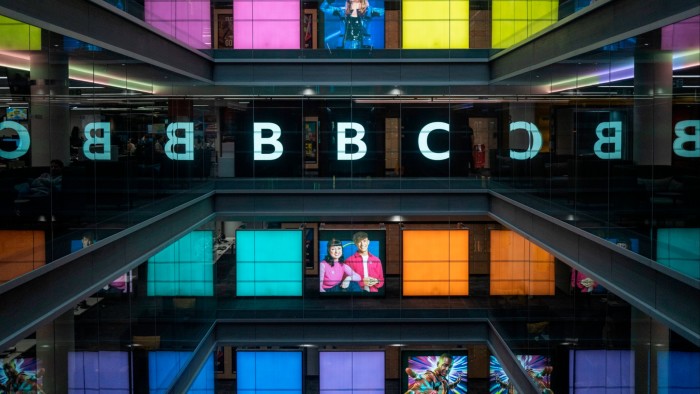Stay informed with free updates
Simply sign up to the Media myFT Digest — delivered directly to your inbox.
Paul Marshall, the hedge fund boss and co-owner of GB News, has called for the BBC to be broken up or sold, in a speech describing the national broadcaster as “an embodiment of anti-competitive market distortion”.
Marshall, who also owns The Spectator magazine and online media group UnHerd, gave a lecture at Oxford university on Tuesday arguing that the BBC was “held to a lower standard of impartiality than any other channel” and that it marks its “own homework”.
He described the BBC as squatting “like a giant toad in the middle of the UK media landscape, an embodiment of anti-competitive market distortion, as well as the source of many of the worst cases of media bias”.
The British hedge fund boss suggested a solution would be to sell the BBC. “As long as the BBC remains a ward of the state, it will continue to be the propaganda arm of the state”, Marshall said.
He argued that, at the least, the BBC should be broken up between its public service elements, such as news, and commercially focused activities, such as the BBC Studios production company.
A BBC spokesperson said: “The BBC is the number one brand for media in the UK, used by 95 per cent of UK adults on average per month, and the most used and trusted news provider.
“We . . . are engaging with the public and government on what the long term future of the BBC should look like.”
Last week, BBC director-general Tim Davie said in a speech that “trust in the BBC went up in 2024” because of its focus on “impartiality and transparency”.
He pointed to its work tackling the risks of disinformation, as well as “doubling down on impartiality, championing free, fair reporting alongside landmark investigative journalism . . . as well as increasing transparency and frankly holding our nerve amidst culture wars”.
Separately, Marshall complained that UnHerd had been the victim of an online shadow ban — in effect, he argued, being pushed to the margins by algorithms that can dictate what is better read and watched online.
He said that social media platforms should be required to publish all algorithms which they use to analyse or influence user preferences. “Elon Musk believes in open source and transparency for manufacturing. He should do the same for X,” he said.
Marshall also said that Sky — which owns a news channel that competes with GB News — had been moved “to the progressive left” by its US owner, Comcast, “effectively becoming a clone of the BBC”.
He predicted Sky would drop out of regular news coverage in the UK once Comcast’s 10-year commitment to invest in UK news expires. Sky declined to comment.
Marshall has in recent years emerged as one of the UK’s most influential right-leaning media barons.
A self-styled “classical liberal”, Marshall built his fortune as co-founder of London-based hedge fund Marshall Wace. Since its launch in 1997, it has grown into one of the world’s leading hedge funds, with over $70bn in assets under management.
Marshall is also chair of Marshall Wace Asset Management but holds his media investments in a private capacity.
Marshall’s first foray into the media industry came in 2017 with the purchase of UnHerd. Soon after, he invested in upstart British broadcaster GB News.
In September last year Marshall boosted his growing British media empire with the acquisition of conservative weekly magazine The Spectator for £100mn. The move prompted the resignation of Spectator chair Andrew Neil, who had previously said that hedge fund managers should not be allowed to own newspapers because of potential conflicts of interest.



